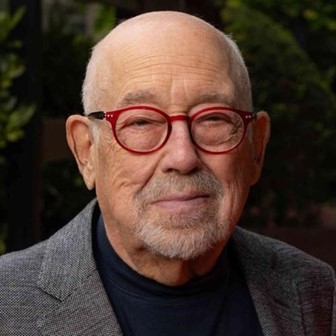Paul Martin Wolff passed away peacefully on June 10, surrounded by family.
Impatient and eager right from the start, he was born prematurely in Kansas City, Missouri, the doctors telling his mother that he wasn't going to make it. But with the shear tenacity and strength of character that would set the standard for his entire life, he not only survived but went on to lead a remarkable life, changing the lives of people around him for the better everywhere he went.
Paul graduated from Southwest High School in Kansas City and went on to the University of Wisconsin-Madison. He graduated in 1963 with highest honors in American history, studying under Merle Curti, Pulitzer-Prize-winning American social and intellectual historian. He served as honors convocation speaker for his graduating class. He then graduated from Harvard Law School. After serving as law clerk to the Honorable James R. Durfee, he joined the law firm of Williams & Connolly as an associate. He always said he was traded by Judge Durfee to his friend, Edward Bennett Williams, for better seats and a better parking space at RFK Stadium. He remained a part of Williams & Connolly his entire legal career, as partner, managing partner and senior counsel. Known for his sense of humor and incredibly quick wit, he was always popular and made friendships in college, law school and the early years at Williams & Connolly that would last his lifetime. Importantly, he was known as a first-rate litigator.
Meeting Rhea Schwartz would shift the paradigm of his life. They married in 1976 and spent almost 48 years enriching each other's lives. Because of Rhea's interests, he went to ballets and more figure skating competitions than he could count. He supported her in everything she did. They loved to travel and took long trips to "exotic" locations before it was the cool thing to do.
But Wolff lived a double life. In mid-life he gave expression to his life-long interest in art and sculpture and became a successful sculptor. He was represented by Zenith Gallery and his sculpture appears in homes, law firms, hotels, as well as at the Harvard Law School.
After sculpture he took an interest in abstract painting and pastels. He learned fly-fishing in mid-life as well, becoming an avid participant, and using it as an excuse to travel and be with his college buddies
He was an active member of the community in which he lived. He was a founder of the Washington Council of Lawyers. He served as a trustee of the Washington Lawyers Committee for Civil Rights and Urban Affairs, as a trustee of the Stiller Foundation, and on the board of the Washington Legal Clinic for the Homeless. He was the 2004 recipient of the Learned Hand Award for service to the legal community. He was a fellow of the American Bar Foundation and the American Law Institute, and was an adjunct professor at the Catholic University Law School.
He was for many years a director, vice chairman and honorary director of the Washington Performing Arts Society. He served as a director of the Renwick Museum Alliance and as an overseer of the Corcoran Gallery of Art. He served as a director of the National Music Center and Museum, a joint effort of the Federal City Council, the Smithsonian, and the Library of Congress to develop a national music museum and performance space in the Nation's Capital. He served on the acquisition committee of the Jewish Museum in New York City. He also served on the board of the Federal City Council, the Economic Club of Washington, the Emeritus Foundation and the Opportunities for Older Americans Foundation.
As a strong believer in the importance of public education, he was a director of the Committee on Public Education and was vice chairman of the DC Public Charter School Resource Center. He was a trustee of American University and a member of the Board of Visitors of its Kogod School of Business Administration.
In appreciation of his training under Professor Curti, Paul endowed the Curti Prize, given by the Organization of American Historians for outstanding work in American and intellectual history. He served on its Leadership Council as well as the Advisory Council of the Woodrow Wilson International Center for Scholars.
A lifetime baseball fanatic, as a less than mediocre player and then as an avid fan, he spent ten years working to bring major league baseball back to Washington; first as a founding director of the DC Sports and Entertainment Commission and as a partner in Washington Baseball Club, LLC.
Grateful for his experience at the University of Wisconsin - Madison, in 2022 Paul and Rhea endowed the Wolff Fellowship in the College of Letters & Science which provides funding for a year of post-graduate travel and community service. They established an identical Fellowship at Penn State University, Rhea's alma mater. They gifted the Rhea S. Schwartz and Paul Martin Wolff Sculpture Gallery to the Palmer Museum at Penn State University. When he died, the Paul Martin Wolff Center for American Thought, Culture and Society at UW-Madison was being created.
Gifts in memory of Paul may be made payable to the 'UW Foundation,'--Paul Martin Wolff Center for American Thought, Culture, and Society (Fund #132540200). Mail to: UW Foundation, US Bank Lockbox Box 78807 Milwaukee, WI 53278-0807, online at http://supportuw.org/giveto/WolffMemorial or to a charity of your choice.
He is survived by his wife, Rhea Schwartz; his brother, Dr. Lawrence Wolff and his wife, Diana; his niece Sarah and her husband Aaron Hulse; Nancy Wolff, the widow of his late brother, David; his niece Jessica Wolff Broadlick, her husband, Jimmy, their son, Thatcher; and his nieces Melanie, Tiffany and Briana Morgan. Until his death, Melanie and Wolff did the New York Times crossword puzzle together, daily, long-distance, no matter where in the world each was.
A Celebration of Life will be held in the fall. Online condolences for the family may be left at louismemorialchapel.com.



